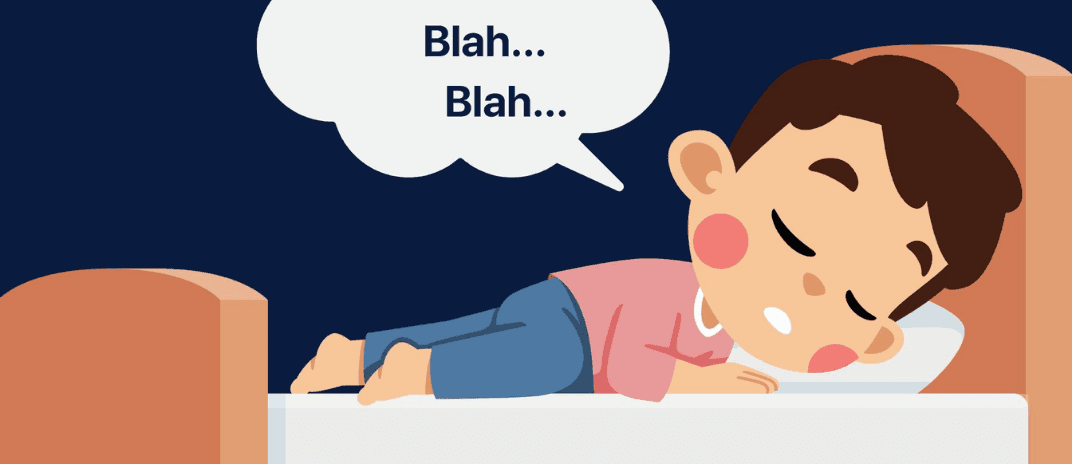


Tired of being startled awake by your late-night chatter? Learn how to quiet those sleep conversations and achieve restful nights.
Discover the triggers and causes behind sleep talking, establish a consistent sleep schedule, and practice better sleep hygiene. By making simple lifestyle adjustments and managing stress, you can reduce sleep talking occurrences.
Dive into the world of sleep routine and hygiene to transform disruptive nights into peaceful sleep.
Identifying the root causes and triggers of sleep talking can aid in effectively managing and reducing this nighttime phenomenon. Sleep talking may be caused by various factors such as stress, anxiety, sleep deprivation, fever, substance abuse, and certain medications.
Symptoms of sleep talking include mumbling, shouting, or speaking incoherently during sleep. To stop sleep talking, it’s essential to address the underlying causes. Treatment for sleep talking focuses on improving sleep hygiene, reducing stress levels, and ensuring adequate rest.
Creating a calming bedtime routine, avoiding caffeine and heavy meals before sleep, and seeking professional advice if necessary can help in managing and decreasing episodes of sleep talking. By understanding the causes of sleep talking, you can take steps towards a more peaceful night’s rest.
Understand the common symptoms of sleep talking to recognize this behavior in yourself or others.
Sleep talking is often related to dreaming or transitions between sleep stages. Triggers such as genetics, stress, or anxiety can influence this behavior. While generally harmless and not typically requiring treatment for health reasons, identifying symptoms can help you understand and manage sleep talking.
If you or someone you know experiences these symptoms frequently, consider implementing strategies like improving sleep hygiene, managing stress, and seeking professional advice to reduce sleep-talking episodes.
To effectively manage and reduce sleep talking, you should prioritize establishing a consistent sleep schedule. It’s essential to keep a sleep diary to track your sleep patterns and identify any triggers related to sleep talking.
Maintaining enough sleep each night, ideally 7 to 9 hours, is crucial for reducing the likelihood of becoming a frequent sleep talker. By following a consistent bedtime and wake-up routine, you can improve your overall sleep quality and decrease the chances of experiencing sleep talking episodes.
Improve your sleep hygiene practices by prioritizing a calming bedtime routine and creating a sleep-conducive environment.
To reduce instances of sleep talking, ensure your bedroom is free from bright lights and loud noises. Opt for a comfortable mattress and pillows to enhance sleep quality.
Chronic fatigue and irregular sleep patterns can contribute to talking in your sleep. By adopting good sleep hygiene habits and maintaining a relaxing nighttime routine, you can promote better sleep quality and potentially decrease the occurrence of sleep talking.
To limit caffeine intake for better sleep, aim to consume no more than 400mg of caffeine per day. Avoid consuming more than this amount to improve your sleep quality.
Here are some tips to help you in limiting caffeine intake:
By following these strategies, you can reduce caffeine consumption, get better sleep, and potentially stop talking in your sleep.
If you struggle with sleep talking despite limiting caffeine, consider speaking to your doctor for further advice on how to improve your sleep hygiene.
Consider using a sleep diary to track your sleep patterns and potential triggers for sleep talking. Recording details like bedtime, wake time, stress levels, and any medications taken can help identify patterns related to talking in your sleep.
By consistently jotting down this information, you may uncover connections between certain factors and episodes of sleep talking. People talk in their sleep for various reasons, and a sleep diary can assist in pinpointing specific triggers that might contribute to this behavior.
Analyzing your sleep habits through a diary could provide valuable insights into your sleep-talking tendencies, potentially aiding in finding solutions to reduce or eliminate this occurrence.
Improve your sleep hygiene by establishing a consistent bedtime routine. Going to bed and waking up at the same time each day can help regulate your body’s internal clock, reducing the likelihood of sleep-talking episodes.
Ensure your bedroom is conducive to sleep by keeping it cool, dark, and quiet. Engage in calming activities before bed, such as reading or taking a warm bath, to signal to your body that it’s time to wind down.
Avoid stimulants like caffeine and heavy meals close to bedtime, as they can interfere with your ability to fall asleep. By prioritizing good sleep hygiene practices and sticking to a regular sleep schedule, you can promote better sleep quality and potentially decrease instances of sleep talking.

For professional advice and support regarding sleep talking, consult with a healthcare provider to explore potential medication adjustments or stress management techniques. Seeking help from a professional can provide personalized solutions to address your specific sleep-talking concerns. Here are some ways they can assist you:

Now that you have a better understanding of the triggers and causes of sleep talking, as well as practical tips to reduce its occurrence, you’re equipped to take control of your sleep hygiene and routine.
By establishing a consistent sleep schedule, improving your sleep hygiene practices, and seeking professional support if needed, you can say goodbye to disruptive sleep talking and hello to peaceful, restful nights.
Sweet dreams!
Chaput, J. P., Dutil, C., & Sampasa-Kanyinga, H. (2018). Sleeping hours: what is the ideal number and how does age impact this?. Nature and science of sleep, 10, 421–430. https://doi.org/10.2147/NSS.S163071